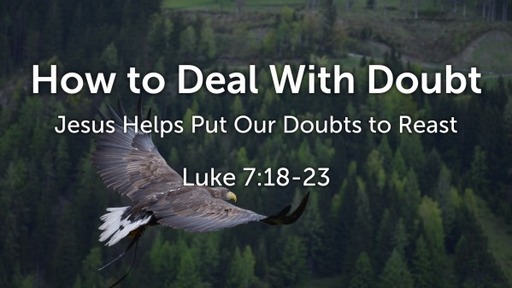How to Deal with Doubt

There is a difference between doubt and unbelief. Doubt is a matter of the mind: we cannot understand what God is doing or why He is doing it. Unbelief is a matter of the will: we refuse to believe God’s Word and obey what He tells us to do. “Doubt is not always a sign that a man is wrong,” said Oswald Chambers; “it may be a sign that he is thinking.” In John’s case, his inquiry was not born of willful unbelief, but of doubt nourished by physical and emotional strain.
Remember how, after the text was read, Jesus gave a very brief sermon, declaring to the congregation, ‘Today, this Scripture has been fulfilled in your hearing.’ That bold declaration earned him the unmitigated wrath of his hearers. They didn’t miss the point; they understood that Jesus was saying that he was the fulfilment of Isaiah’s predictions of the coming Messiah. Here in this text, when Jesus returns the message to John the Baptist, he sends in the message a clue that John, being steeped in the Old Testament, would certainly not overlook. John would get the message. Jesus doesn’t give a direct answer. He just says, ‘Tell John what I am doing. Tell John to remember what the Scriptures say.’
Then Jesus adds something to the message to his dear friend, John: ‘Blessed is the man who does not fall away on account of me’ (7:23). Do you like to keep your religious affections a secret, particularly from your friends who are not enamoured by Christ? Is there a sense in which Jesus, though you embrace him as your Redeemer, is still a bit offensive to you? There are many, many people who struggle with that. But Jesus said, ‘Blessed is the man who does not fall away on account of me.’
Something very human is going on here in this narrative. To have a loyal friend, someone on whom you can count in a time of crisis, is a great privilege. There are very few people in this world who are so loyal to other people, and care that deeply, that they will stand beside them in the worst moments of human crisis, particularly if it involves a personal risk to do so. John’s life was on the line. He would eventually be beheaded because of his faithfulness to the mission that God had given him. But Jesus pronounced a blessing on those who would not stumble over him, on those who would remain loyal to him in the midst of their doubts and in the midst of difficult circumstances.
There is something very important in this exchange between Jesus and the disciples of John. How would you feel if a close friend and supporter sent a message to you which said, ‘I am not really sure whether you are who I thought you were. Should I look for somebody else?’ The normal human reaction would be to retaliate with criticism about the other person. But not Jesus. Jesus takes this occasion, after answering the enquiry of John, to give public testimony to his own endorsement of the greatness of John the Baptist. Jesus understood the agony of the attack of the enemy on John; Jesus understood what loneliness and solitude could do; Jesus understood that John the Baptist was perhaps a bit impatient for Jesus to get on with his Messianic agenda. He also understood that John was not a cowardly weakling who blew hot and cold with every wind of public opinion.
